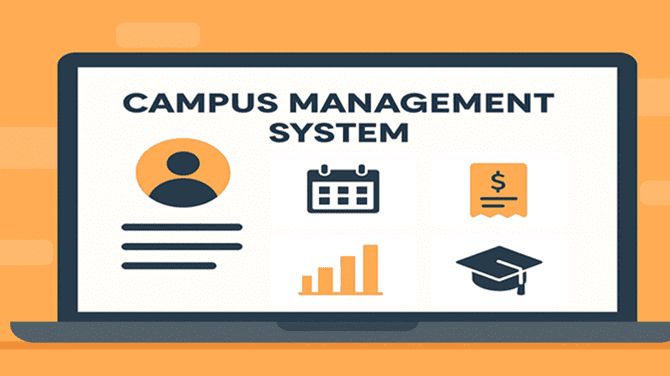Your school may have a well-designed website, but if it’s not appearing in search results, prospective students may never find it. Visibility issues can silently erode trust and drastically reduce enrollment inquiries.
Many schools overlook how SEO and digital infrastructure influence rankings. Beyond design, what's under the hood—like your Campus Management System Software, can make or break performance online.
The Hidden Costs of Low Search Rankings
When a school website doesn’t rank well, it misses out on prospective students, parent inquiries, and even funding opportunities. SEO isn’t just about keywords. It’s about how your site is structured, how fast it loads, whether content matches user intent, and whether search engines understand what your pages are about.
Most school administrators assume that their CMS or IT department handles all that. Unfortunately, a gap often exists between what’s needed for SEO and what’s being delivered.
Common Reasons School Websites Fail to Rank
Several recurring technical and strategic missteps cause school websites to underperform on Google and Bing.
Poor On-Page Optimization
Even if your school’s website has good content, missing meta titles, H1 tags, and unclear keyword usage will make it invisible to search engines. Each page should have a clear topic, structured layout, and internally linked keywords relevant to educational searches.
Slow Page Load Times
Parents and students won't wait long for a website to load. Google penalizes slow-loading sites in rankings. Compressing images, using caching, and removing unused code can improve load times significantly.
Not Mobile Friendly
Over 60% of users access school websites on mobile devices. If your site isn't responsive, Google will deprioritize it. Make sure all pages render cleanly on smartphones and tablets, including admission forms, course listings, and contact pages.
No SEO Strategy in Place
Many schools build content and hope for traffic. SEO requires intent: mapping keywords to target audiences, writing optimized content, and tracking performance. This strategy is not just a one-time effort—it requires continuous maintenance and updates.
How Your CMS Affects SEO Outcomes
A school’s CMS—or backend content system—controls how your website loads, updates, and scales. A poor CMS setup can result in messy URLs, duplicate content, or code that’s unreadable to search engines.
A streamlined backend system like a Campus Management System Software ensures content is logically structured, error-free, and SEO-ready. It automates scheduling of updates, helps manage faculty and department pages, and avoids technical glitches that may harm rankings.
Affordable SEO Services London: What They Can Do for Your School
While many schools assume SEO services are costly, Affordable SEO Services London providers offer targeted packages that specifically cater to the education sector. Here’s what they can deliver:
-
SEO Audits for Academic Websites
A thorough audit highlights indexing errors, duplicate meta tags, crawl issues, and keyword gaps. These insights allow schools to prioritize fixes that offer the most significant visibility gains. -
On-Page Optimization for Course and Admission Pages
Education-focused SEO services know what parents and students search for. They can help rewrite admissions content to include long-tail keywords, clean up headers, and improve user engagement metrics. -
Local SEO for Regional Reach
Ranking well locally ensures your institution is discovered by nearby students. Google Business Profile optimization, local backlinks, and citation management are key here. -
Content Strategy and Blogging for Authority
Schools that publish student success stories, academic articles, and open day announcements tend to attract more backlinks and trust signals—essential for higher rankings. -
Technical Fixes That Don’t Disrupt Your CMS
Expert SEO services collaborate with your IT or CMS team to implement schema markup, XML sitemaps, and structured data—boosting searchability without breaking the site.
SEO Success Metrics for School Websites
Knowing if your SEO efforts are working requires the right KPIs. Your marketing or admissions team should monitor:
-
Organic Search Traffic
A steady month-on-month increase signals better visibility and improved rankings. -
Form Fill or Inquiry Submissions
These directly tie SEO performance to student engagement. If rankings improve, inquiries should follow. -
Keyword Rankings for Core Programs
Track how your site ranks for terms like “best school in [city]” or “IB schools near me.” -
Bounce Rate and Session Duration
A well-optimized site keeps visitors engaged. If your bounce rate drops and average session time increases, SEO is working. -
Backlink Growth and Referring Domains
The more credible sites link to your school, the higher your authority in search engines.
The Competitive Advantage of Modern SEO for Schools
In the UK, educational institutions face increasing competition from private academies, international schools, and e-learning platforms. A high-performing website levels the playing field and establishes your school as a modern, tech-forward institution.
Schools embracing SEO see more applications, better engagement with their communities, and easier communication with alumni and donors. They also streamline administrative tasks, reduce inquiry handling time, and elevate their public perception.
Should You Handle SEO In-House or Outsource?
While some schools have internal IT or marketing staff, SEO often gets buried under other responsibilities. External agencies bring a dedicated focus, analytics tools, and industry benchmarks that internal teams might lack.
That said, the best results happen when agencies collaborate with school staff, aligning branding, goals, and academic positioning. Whether it’s through monthly consulting or full-service management, outside SEO professionals fill the gaps and deliver results that align with enrollment targets.
Conclusion
If your school is losing prospective students, it may not be your curriculum—it could be your search ranking. A poorly optimized site, slow CMS, or unclear content can hold your institution back from reaching families actively looking for a better education. Updating your strategy, integrating a solid campus management system, and investing in the right SEO support can change the trajectory. Better rankings don’t just mean more traffic—they mean more students, higher revenue, and greater impact.


